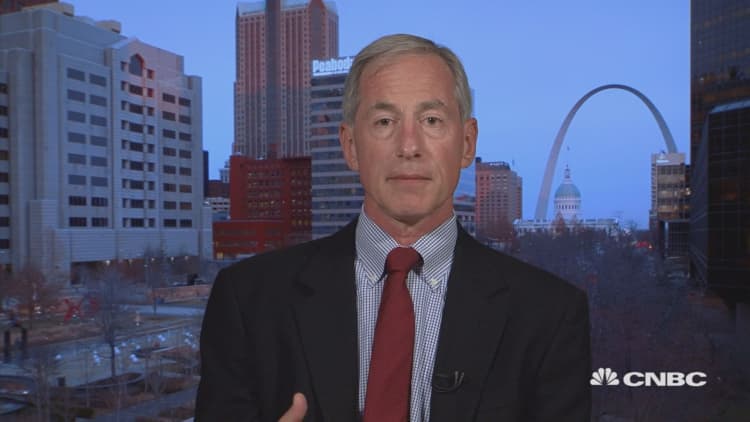The presidential candidates may talk about combating high drug prices, but Express Scripts' Dr. Steve Miller said it takes more than tough talk to make it work. He should know. He helped Express Scripts clients save more than $1 billion on hepatitis C drugs in 2015.
"We can reward companies that are willing to give us lower prices," said Miller, chief medical officer at the nation's largest pharmacy benefit manger, which manages drug benefits for 85 million Americans.
Express Scripts excluded Gilead Sciences' $1,000-a-pill hepatitis drug Sovaldi from its approved drug list last year. By going with a rival brand exclusively, Express Scripts was able to secure a steep discount, cutting the cost of therapy in half.
"We now are a year into it, we've treated over 50,000 patients with hepatitis C," said Miller, the company's chief medical officer. "We've treated more people than ever and had more people cured than ever, at a tremendous savings."
Those measures helped clients hold down overall drug spending growth to 5.2 percent last year, about half the growth rate in 2014 when Sovaldi was the only new hep C drug on the market.
Much of the growth in spending was due to double-digit price increases in high-cost specialty drugs, according to new data in Express Scripts 20th annual drug-trend report. Spending on specialty medications to treat inflammatory conditions such as rheumatoid arthritis topped the list for the first time, as prices spiked nearly 20 percent.
Two of the top rheumatoid brands face competition from non-branded biosimilars in 2017, said Dr. Glen Stettin, chief innovation officer at Express Scripts.
"They're doing what we typically see brand manufacturers do when they face the potential of generic competition, and that's raise the price ahead of the new drugs coming to market," he said.
It Takes More Than Negotiation

Republican presidential candidate Donald Trump and Democratic contenders Hilllary Clinton and Bernie Sanders have all proposed allowing Medicare to negotiate drug prices, the way the pharmacy benefit mangers and private insurers do.
Under current law, Medicare is not allowed to negotiate with drug makers, but that's only half of the problem when it comes to controlling costs.
"Medicare negotiating drug prices sounds like a simple solution, but unless you change the benefit, it actually is not going to bring the prices down," Miller said.
Other government health programs such as Medicaid, the program for the poor, and the Veterans Administration already get discounts. Both those programs also limit which drugs they'll pay for, much like the pharmacy benefit managers and private insurers do. Medicare does not limit drug choices.
"Because many drugs are on their drug list, and it maximizes the choice for patients … it's unlikely the pharmaceutical companies are going to give you great discounts," Miller said. "So, you have to not only negotiate, you have to be willing to change the Medicare plan fundamentally, which patients may not like."
Both Trump and Sanders would allow re-importation of drugs sold for less in Canada. As part of his single payer Medicare for All plan, Sanders has also proposed changing the drug patent system to make generic drugs available sooner, while still promoting the discovery of new medicines, according to his campaign.
"Bernie's plan would establish a multibillion-dollar prize fund to incentivize drug development. This prize fund would replace our country's broken system that drives drug prices up through government-sanctioned monopolies," said Warren Gunnels, policy director for the Sanders campaign. "The Prize Fund would reward medical researchers and developers of medicines based primarily upon the added therapeutic value a new treatment offers and the number of people it benefits."
Drug costs an issue for voters
The problem of rising drug prices is one that resonates with both Democratic and Republican voters. According to the most recent Kaiser Health tracking poll in January, 64 percent of those polled said the high cost of drugs and health care is an important health care issue driving their vote for president.
All of the Republican presidential candidates have vowed to repeal Obamacare, which according to Kaiser remains the number one health care issue for Republican voters.
For registered voters overall, addressing health care costs and Medicare top the Affordable Care Act as issues driving their vote for president.




